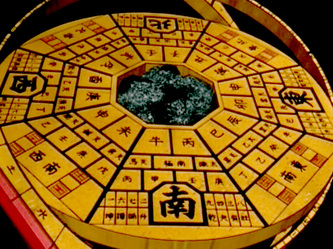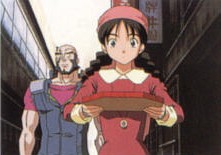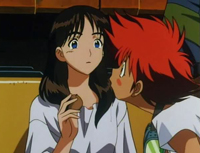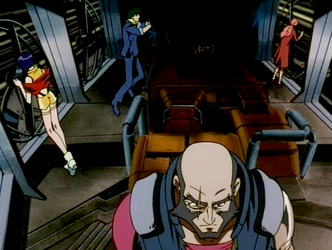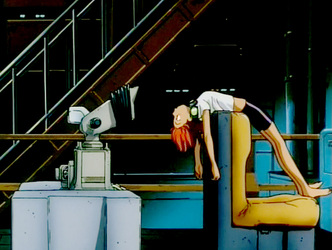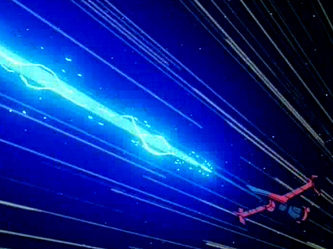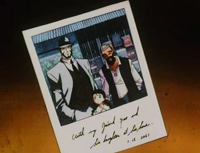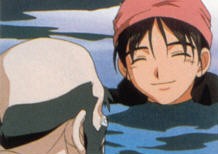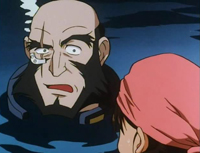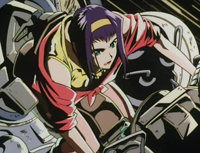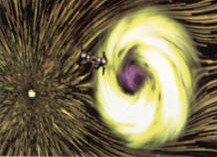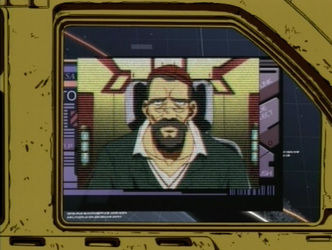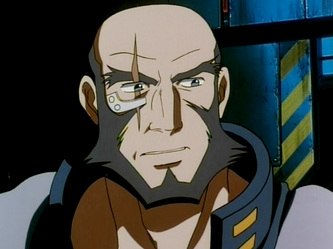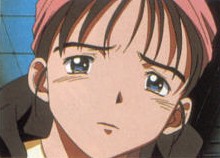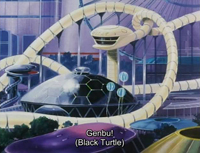Debunking the Misfit Myth
WARNING: This article contains ENDING SPOILERS
I never "got" Boogie Woogie, with all its references to feng shui and magnetic stones and wormholes. We are given a further glimpse into Jet's paternal psyche, but the session, truth be told, just seems bland. Sure, there's some action and wild space chase in the end, and the plot revolved around the ancient Chinese practice of feng shui which ought to have added intrigue at the very least. But at the end of the day, the session is just bland as uncooked oats. What do they mean to sandwich such a plain session in between two unforgettable stories like Pierrot Le Fou (simply bone-chilling session; I hope the CB creators never go into the horror genre) and Cowboy Funk (sublime hilarity)?! What's more, they put this particular piece of dry oat near the climatic ending! Perhaps the fault is my own. This session reveals a bit more about Jet and I simply failed to connect with it.
Yet I've never been able to fully cast aside the nagging feeling that there's more to it than I think. Cowboy Bebop, from beginning to end, is a beautifully choreographed series and yet Boogie Woogie seems to be a bit of a hiccup in the ascension to the magnificent Real Folk Blues.
Given the creators' penchant for hidden stories and messages, however, we probably shouldn't be so quick to dismiss Boogie Woogie. The story of the cat who died and was never reborn again that Spike told in the RFB II is one of the more obvious analogies for his own life; Wen from Sympathy for the Devil is trapped in time, a literal manifestation of Spike's own dilemma. Toys in the Attic, too, may very well be an analogy for Spike's past (refer to More than Just a Parody). So here's an idea about the seemingly plain Boogie Woogie: the key behind this story has nothing to do with Jet. It's not about the orphaned Mei Fa and her father Pao, either. The real star of the show is Spike. In fact, this session is placed so near end of the series precisely because it is supposed to help prepare us for the ultimate ending in the Real Folk Blues.
Yet I've never been able to fully cast aside the nagging feeling that there's more to it than I think. Cowboy Bebop, from beginning to end, is a beautifully choreographed series and yet Boogie Woogie seems to be a bit of a hiccup in the ascension to the magnificent Real Folk Blues.
Given the creators' penchant for hidden stories and messages, however, we probably shouldn't be so quick to dismiss Boogie Woogie. The story of the cat who died and was never reborn again that Spike told in the RFB II is one of the more obvious analogies for his own life; Wen from Sympathy for the Devil is trapped in time, a literal manifestation of Spike's own dilemma. Toys in the Attic, too, may very well be an analogy for Spike's past (refer to More than Just a Parody). So here's an idea about the seemingly plain Boogie Woogie: the key behind this story has nothing to do with Jet. It's not about the orphaned Mei Fa and her father Pao, either. The real star of the show is Spike. In fact, this session is placed so near end of the series precisely because it is supposed to help prepare us for the ultimate ending in the Real Folk Blues.
I reasoned in another article that Spike left the Bebop not only because he needed to come to terms with his past but also because he was looking out for his fellow crew mates. If you don't buy that argument, let us just say that Spike is a headstrong individualist (as is the case with everyone on the Bebop). He did not want others to become involved with the mess that is his syndicate past, and that is perfectly understandable. Suddenly, the story of a man leaving his present life behind to deal with his past rings a bell-- isn't that precisely what we see in Boogie Woogie? The feng shui master Pao has a past he wants to leave behind-- a past that involves a syndicate. The rest of the story goes: he runs away, fakes his own death and even lies to his own daughter about it, but conjures a plan for father and daughter to meet one more time before his actual death. It is evident that Pao cares deeply for his daughter, for the last words we hear him say are, "Meifa... it's wonderful to see you one last time..." and those words are weighed by a sense of helplessness and regret. From these facts we are able to gather much more about Pao's thoughts and motives. He fears (not without reason) that the Blue Snake Syndicate will pursue him till his death and that the ones he cared for will be implicated at some point. Therefore he distances himself from his daughter, Mei Fa, and tries to end his tussle with his own past with a self-destructive plan. His suicide guarantees the safety of his daughter's survival, after all.
One can easily name other one-session characters whom we can deeply feel sympathetic for or at least relate to despite their brief appearances. (Jet's old flame Alisa and Katerina from the first session, anyone?) Perhaps, then, the real point of Boogie Woogie is not for us to psycho-analyze Pao and Mei Fa specifically but for us to look at their situation from a larger perspective. By introducing the more understandable concept of "a father distancing himself in order to protect his daughter" in an earlier session, the idea that the main characters would do something (partly) for the sake of others for a change will no longer seem so foreign the second time round in the Real Folk Blues. At the end of the day Cowboy Bebopis Spike's story, and Boogie Woogie is a session which goes some ways towards explaining his ultimate decision. This session is full of syndicate wild goose chases, and in this show they do not bring syndicates into the picture just for fun.
On a side note, Boogie Woogie also develops the other characters a bit more and deals with the Bebop crew's favorite philosophy, "Don't get involved unless it offers a good return." We've seen time and again how these three bounty hunters only go after a bounty if they think the reward is worth the effort of getting off their lazy asses. These are really pragmatic people we're looking at, but Boogie Woogie is one of the few sessions where we see them going out of their way to save someone they hardly know. There's nothing in it for them as Jet makes clear, "I didn't have any particular favors to repay to Pao." But he goes on to investigate the case with Mei Fa anyway. When the syndicate sends unmanned fighters after the Bebop, Spike and Faye are sent out to fend them off, albeit a tad reluctantly so on Faye's part. Yet the creators made it a point to insert this piece of conversation while the two are on the Swordfish and the Red Tail:
FAYE
What rotten luck of the draw.
SPIKE
Sometimes it's good to act without asking "What's in it for me?" We're fairies who are going to grant the princess' wish.
FAYE
We are, huh?
These are the subtitles, at least. The dubbed version yields a similar story: Faye grumbles, "What the hell am I doing?" to which Spike answers somewhat philosophically, "It's called 'giving', Faye."
Regardless of the version you are watching the point is moot. Sometimes we do things not wholly because we expect something in return but because the action is necessary or, if you want to add a moralistic slant to it, because it is the right thing to do. This perspective, to me, also helps to explain Spike's decision to leave the Bebop in the end. While we are on the differences between the subbed and dubbed version, I would like to point out that the small changes in wordings in the two versions sometimes result in different stories and conclusions. I also watch CB with Chinese subtitles, and that again tells another story. On a few occasions, none of the three versions actually translate the original Japanese dialogue exactly. It makes one wonder just how many stories could be telling in all its ambiguity.
FAYE
What rotten luck of the draw.
SPIKE
Sometimes it's good to act without asking "What's in it for me?" We're fairies who are going to grant the princess' wish.
FAYE
We are, huh?
These are the subtitles, at least. The dubbed version yields a similar story: Faye grumbles, "What the hell am I doing?" to which Spike answers somewhat philosophically, "It's called 'giving', Faye."
Regardless of the version you are watching the point is moot. Sometimes we do things not wholly because we expect something in return but because the action is necessary or, if you want to add a moralistic slant to it, because it is the right thing to do. This perspective, to me, also helps to explain Spike's decision to leave the Bebop in the end. While we are on the differences between the subbed and dubbed version, I would like to point out that the small changes in wordings in the two versions sometimes result in different stories and conclusions. I also watch CB with Chinese subtitles, and that again tells another story. On a few occasions, none of the three versions actually translate the original Japanese dialogue exactly. It makes one wonder just how many stories could be telling in all its ambiguity.
In any case, if we go by the subbed version then Faye here brings up another constant CB motif: that of luck, destiny and the randomness of life. Luck or coincidence is everywhere in the series -- in the form of a deck of poker cards which reveals the Ace of Spades twice in BoFA, or in the form of Spike's hobby which he pursues now and then (read: when he actually finds the time to put down a cigarette)-- fishing. The whole thing with Faye started because Spike and Jet happened to visit that casino on that given day; Spike happened to run into a man that dresses like him and they happened to mix up their chips-- and that sent Faye running after the wrong man et al. Coming back to Boogie Woogie, let it never be said that there was zero character development in this session. Although Spike and Faye were running out to meet the syndicate fighters because they were really looking after the Bebop and not, to paraphrase Spike, to play Mei Fa's "fairies", I would still say they are imperceptibly different from the people who were about to leave a hopeful child behind (who helped them first, no less!) in #9 Jamming with Edward.
I still maintain that this session did not do the best job of making a Spike analogy, but hey, at least Boogie Woogie makes more sense to me now. Does it to you?
[by Leigh].
I still maintain that this session did not do the best job of making a Spike analogy, but hey, at least Boogie Woogie makes more sense to me now. Does it to you?
[by Leigh].
Want to share your thoughts on this essay? Join in the discussion in the Comments section:
HTML Comment Box is loading comments...
